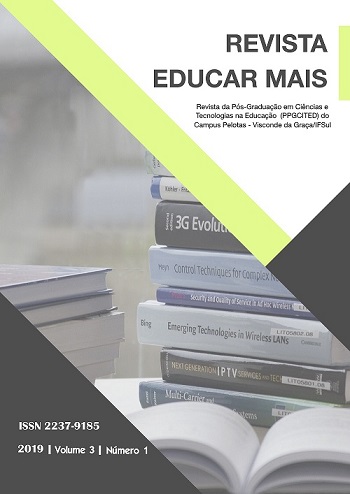Projeto Robótica Pedagógica: o resgate do PROUCA para o Ensino de Ciências – na educação 4.0
DOI:
https://doi.org/10.15536/reducarmais.3.2019.79-86.1406Keywords:
Robótica Pedagógica, PROUCA, Arduino, Ardublockly, BNCC.Abstract
O presente artigo vem demonstrar a importância da Robótica Pedagógica como forma de ensino nos anos finais do Ensino Fundamental, por meio do resgate do Programa Um Computador por Aluno (Prouca) para a Robótica Pedagógica, as plataformas Arduino e Ardublockly, de acordo com a BNCC – Base Nacional Comum Curricular junto ao Ensino de Ciências – Física. Com isso, desenvolveu-se uma análise quantitativa, a partir de projeto de oficinas e treinamentos de introdução à robótica pedagógica na escola municipal Major Cornélio Peixoto no município de Santo Antônio do Tauá no estado do Pará, possibilitando aos professores e alunos a oportunidade de ampliar as discussões das teorias estudadas em sala de aula, com apoio do Laboratório de Engenhocas da Universidade Federal do Pará (UFPA). observou-se, que a utilização da Robótica Pedagógica deve ser incentivada, planejada e desenvolvida considerando os aspectos de aprendizagem, interagindo de forma consciente com os alunos, propiciando um despertar ativo e dedicado, o que irá refletir positivamente no desenvolvimento crítico do aluno com relação aos seus conhecimentos científicos, estimulando para a formação de futuros engenheiros, e profissionais da área de Ciências Exatas em geral, para que possam utilizar de todo aprendizado adquirido na área de ciência e tecnologia, para assim, ingressarem de forma qualificada no mercado de trabalho.Downloads
Downloads
Published
How to Cite
Issue
Section
License
DECLARATION OF RESPONSIBILITY: I hereby certify that I partially or fully participated in the conception of the work, that I did not hide any links or financial agreements between the authors and companies that may be interested in this article publication. I certify that the text is original and that the work, partially or fully, or any other work with a substantially similar content written by me, was not sent to any other journal and it will not be send while my submission is being considered by Revista Educar Mais, whether in printed or electronic format.
The author responsible for the submission represents all the authors of the manuscript and, when sending the article to the journal, guarantees s/he has obtained the permission to do so, as well as s/he guarantees the article does not infringe upon anyone’s copyright nor violate any proprietary rights. The journal is not responsible for the opinions expressed.
Revista Educar Mais is Open Access, does not charge any fees, whether for submission or article processing. The journal adopts Budapest Open Access Initiative (BOAI)’s definition, i.e., any users are permitted to read, download, copy, distribute, print, search and link to the full texts of these articles.
All the articles are published under the Creative Commons Atribuição-NãoComercial 4.0 Internacional license. The authors keep the copyright of their production. That way, they must be contacted directly if there is any interest in commercial use of their work.
















 Esta obra está licenciada com uma Licença
Esta obra está licenciada com uma Licença 